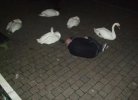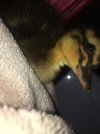In honour of Lord Duckings,
Duck is the common name for numerous species of waterfowl in the family Anatidae. Ducks are generally smaller and shorter-necked than swans and geese, which are members of the same family. Divided among several subfamilies, they are a form taxon; they do not represent a monophyletic group (the group of all descendants of a single common ancestral species), since swans and geese are not considered ducks. Ducks are mostly aquatic birds, and may be found in both fresh water and sea water.Ducks are sometimes confused with several types of unrelated water birds with similar forms, such as loons or divers, grebes, gallinules and coots.
Mallard duckling preening
Ducks eat food sources such as grasses, aquatic plants, fish, insects, small amphibians, worms, and small molluscs.
Dabbling ducks feed on the surface of water or on land, or as deep as they can reach by up-ending without completely submerging. Along the edge of the beak, there is a comb-like structure called a pecten. This strains the water squirting from the side of the beak and traps any food. The pecten is also used to preen feathers and to hold slippery food items.
Diving ducks and sea ducks forage deep underwater. To be able to submerge more easily, the diving ducks are heavier than dabbling ducks, and therefore have more difficulty taking off to fly.
A few specialized species such as the mergansers are adapted to catch and swallow large fish.
The others have the characteristic wide flat beak adapted to dredging-type jobs such as pulling up waterweed, pulling worms and small molluscs out of mud, searching for insect larvae, and bulk jobs such as dredging out, holding, turning head first, and swallowing a squirming frog. To avoid injury when digging into sediment it has no cere, but the nostrils come out through hard horn.
The Guardian (British newspaper) published an article advising that ducks should not be fed with bread because it damages the health of the ducks and pollutes waterways.

A Muscovy duckling
Ducks generally only have one partner at a time, although the partnership usually only lasts one year Larger species and the more sedentary species (like fast-river specialists) tend to have pair-bonds that last numerous years. Most duck species breed once a year, choosing to do so in favourable conditions (spring/summer or wet seasons). Ducks also tend to make a nest before breeding, and, after hatching, lead their ducklings to water. Mother ducks are very caring and protective of their young, but may abandon some of their ducklings if they are physically stuck in an area they cannot get out of (such as nesting in an enclosed courtyard) or are not prospering due to genetic defects or sickness brought about by hypothermia, starvation, or disease. Ducklings can also be orphaned by inconsistent late hatching where a few eggs hatch after the mother has abandoned the nest and led her ducklings to water.
A common urban legend claims that duck quacks do not echo; however, this has been proven to be false. This myth was first debunked by the Acoustics Research Centre at the University of Salford in 2003 as part of the British Association's Festival of Science. It was also debunked in one of the earlier episodes of the popular Discovery Channel television show MythBusters.

Ringed teal
Ducks have many predators. Ducklings are particularly vulnerable, since their inability to fly makes them easy prey not only for predatory birds but also for large fish like pike, crocodilians, predatory testudines such as the alligator snapping turtle, and other aquatic hunters, including fish-eating birds such as herons. Ducks' nests are raided by land-based predators, and brooding females may be caught unaware on the nest by mammals, such as foxes, or large birds, such as hawks or owls.
Adult ducks are fast fliers, but may be caught on the water by large aquatic predators including big fish such as the North American muskie and the European pike. In flight, ducks are safe from all but a few predators such as humans and the peregrine falcon, which uses its speed and strength to catch ducks.
Duck is the common name for numerous species of waterfowl in the family Anatidae. Ducks are generally smaller and shorter-necked than swans and geese, which are members of the same family. Divided among several subfamilies, they are a form taxon; they do not represent a monophyletic group (the group of all descendants of a single common ancestral species), since swans and geese are not considered ducks. Ducks are mostly aquatic birds, and may be found in both fresh water and sea water.Ducks are sometimes confused with several types of unrelated water birds with similar forms, such as loons or divers, grebes, gallinules and coots.
Feeding
Pecten along the beakMallard duckling preening
Ducks eat food sources such as grasses, aquatic plants, fish, insects, small amphibians, worms, and small molluscs.
Dabbling ducks feed on the surface of water or on land, or as deep as they can reach by up-ending without completely submerging. Along the edge of the beak, there is a comb-like structure called a pecten. This strains the water squirting from the side of the beak and traps any food. The pecten is also used to preen feathers and to hold slippery food items.
Diving ducks and sea ducks forage deep underwater. To be able to submerge more easily, the diving ducks are heavier than dabbling ducks, and therefore have more difficulty taking off to fly.
A few specialized species such as the mergansers are adapted to catch and swallow large fish.
The others have the characteristic wide flat beak adapted to dredging-type jobs such as pulling up waterweed, pulling worms and small molluscs out of mud, searching for insect larvae, and bulk jobs such as dredging out, holding, turning head first, and swallowing a squirming frog. To avoid injury when digging into sediment it has no cere, but the nostrils come out through hard horn.
The Guardian (British newspaper) published an article advising that ducks should not be fed with bread because it damages the health of the ducks and pollutes waterways.
Breeding

A Muscovy duckling
Ducks generally only have one partner at a time, although the partnership usually only lasts one year Larger species and the more sedentary species (like fast-river specialists) tend to have pair-bonds that last numerous years. Most duck species breed once a year, choosing to do so in favourable conditions (spring/summer or wet seasons). Ducks also tend to make a nest before breeding, and, after hatching, lead their ducklings to water. Mother ducks are very caring and protective of their young, but may abandon some of their ducklings if they are physically stuck in an area they cannot get out of (such as nesting in an enclosed courtyard) or are not prospering due to genetic defects or sickness brought about by hypothermia, starvation, or disease. Ducklings can also be orphaned by inconsistent late hatching where a few eggs hatch after the mother has abandoned the nest and led her ducklings to water.
Communication
Female mallard ducks (as well as several other species in the genus Anas, such as the American and Pacific black ducks, spot-billed duck, northern pintail and common teal) make the classic "quack" sound while males make a similar but raspier sound that is sometimes written as "breeze", but, despite widespread misconceptions, most species of duck do not "quack". In general, ducks make a range of calls, including whistles, cooing, yodels and grunts. For example, the scaup – which are diving ducks – make a noise like "scaup" (hence their name). Calls may be loud displaying calls or quieter contact calls.A common urban legend claims that duck quacks do not echo; however, this has been proven to be false. This myth was first debunked by the Acoustics Research Centre at the University of Salford in 2003 as part of the British Association's Festival of Science. It was also debunked in one of the earlier episodes of the popular Discovery Channel television show MythBusters.
Predators

Ringed teal
Ducks have many predators. Ducklings are particularly vulnerable, since their inability to fly makes them easy prey not only for predatory birds but also for large fish like pike, crocodilians, predatory testudines such as the alligator snapping turtle, and other aquatic hunters, including fish-eating birds such as herons. Ducks' nests are raided by land-based predators, and brooding females may be caught unaware on the nest by mammals, such as foxes, or large birds, such as hawks or owls.
Adult ducks are fast fliers, but may be caught on the water by large aquatic predators including big fish such as the North American muskie and the European pike. In flight, ducks are safe from all but a few predators such as humans and the peregrine falcon, which uses its speed and strength to catch ducks.









